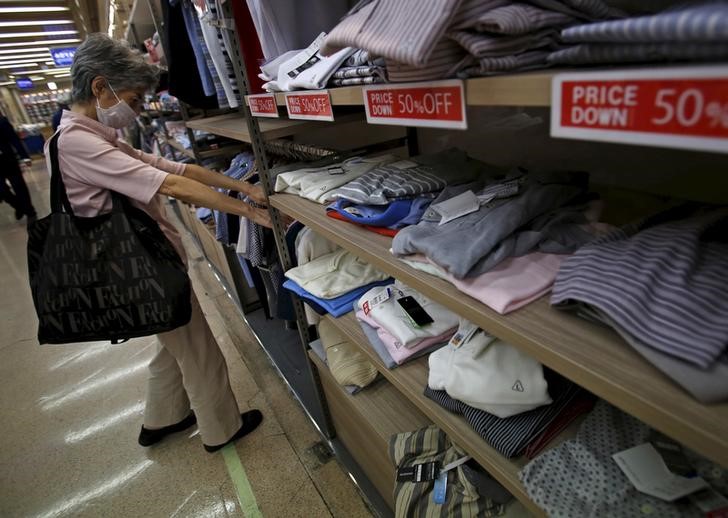By Izumi Nakagawa and Stanley White
TOKYO (Reuters) - Do not believe in official statistics, Japanese retailers seem to be saying, as they cut earnings forecasts and warn of lacklustre consumer spending, a key growth engine for Japan at a time when exports and factory output are stalling.
If you go by the larger-than-expected 2.9 percent gain in household spending in August - the first year-on-year rise in three months - then consumption looks like it is finally alive and well again, after a sales tax hike last year stifled the economy.
But profits of retailers suggest the spending data, which has a small sample size, has not captured the full picture. Restrained household consumption raises the stakes for a central bank policy meeting on Oct. 30, and for the government's plan to flesh out new economic policies before the year-end.
"Consumer spending has ground to a halt," said Noritoshi Murata, president of Seven & i Holdings (T:3382). "There are a lot of concerns about the global economy and not many positives for consumption. Weak spending could continue into the second half of the fiscal year."
Seven & i, which operates Japan's ubiquitous 7-Eleven convenience stores, on Oct. 8 trimmed its full-year profit forecast by 1.6 percent to 367 billion yen ($3.05 billion) and cut its revenue forecast by 3.9 percent to 6.15 trillion yen, triggering a fall in its shares in Tokyo.
The main problem is wages are not rising fast enough to keep pace with rising food prices, and consumers are starting to cut back on other goods.
Real wages, adjusted for inflation, rose 0.5 percent in July from a year earlier. That was the first gain in 27 months. But wage growth subsequently slowed to 0.2 percent in August, and summer bonuses fell from last year, government data shows.
Another problem is more and more workers are getting stuck in jobs with low pay. Part-time and irregular workers comprised a record 37.4 percent of the workforce last year, according to the National Tax Bureau.
Irregular workers earn on average less than half of what regular full-time workers earn, tax data show.
The third problem is the government plans to raise the nationwide sales tax again, to 10 percent in 2017 from 8 percent, and households are already changing their behaviour.
"Shoppers are tightening their purse strings," said Masaaki Yoshizawa, senior managing director at apparel maker Onward Holdings (T:8016).
"There is a lot of uncertainty about consumer spending, and another sales tax hike is on the way. Women are cutting back on clothes."
Onward Holdings had expected to make a 2.4 billion yen profit in the six months ended September. But when it closed its books, operating profit was only 200 million yen.
LOW GROWTH
Some economists worry consumer spending is now stuck in a prolonged period of very low growth.
In June and July, same-store sales at Fast Retailing's (T:9983) Uniqlo clothing outlets in Japan fell from a year earlier before notching modest gains of 2.5 percent and 2.6 percent in August and September, respectively.
Earnings from Japan's retailers show consumer spending has undergone a reversal from the early days of Prime Minister Shinzo Abe's administration.
Shortly after Abe took office late in 2012, the wealthy cashed in on a stock rally and went shopping. Unions got the pay increases they asked for, and companies started raising retail prices.
Since then, the monetary and fiscal measures taken by Abe to rekindle Japan's economy have delivered uneven results.
A sales tax hike last year to 8 percent from 5 percent helped tip the economy into a brief recession.
Now, the world's third-largest economy is at risk of falling into its fourth recession in the past five years as exports, factory output and consumer spending stumble.
Abe had a bold agenda of ending deflation and knocking down the barriers to growth, but many economists say the requisite policies never really materialized.
Now the retail sector is adapting to a return to more subdued household spending.
"Some companies are starting to realise they've actually driven away some customers by raising retail prices," said Norio Miyagawa, senior economist at Mizuho Securities.
"The government's initial growth strategy did not really expand the pie. Now the government is simply left trying to redistribute wealth."
